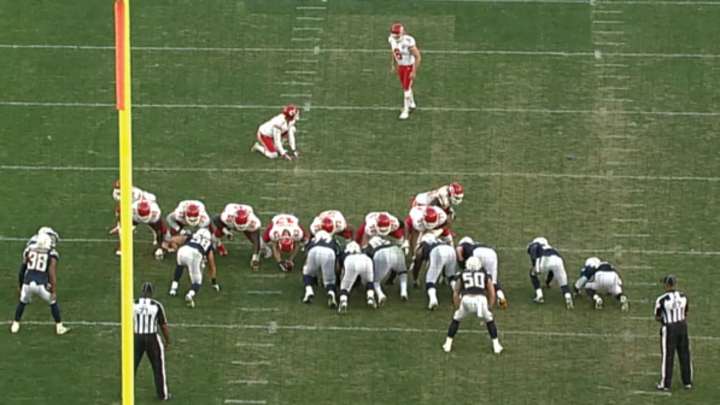NFL admits that Chargers got away with an uncalled penalty on Chiefs' missed field goal

The Chargers definitely got away with one here.
It's rarely just one call that bites you in a loss, but the Kansas City Chiefs have reason to be angry at the officiating in their 27-24 loss to the San Diego Chargers on Sunday. The loss didn't affect Kansas City's playoff positioning -- it had the AFC's fifth seed wrapped up, which is why it rested many of its starters. However, with eight seconds left in regulation, the Chiefs were in position to win the game as Ryan Succop lined up to kick a 41-yard game-winning field goal from the San Diego 23. Succop missed the try just barely to right, the game went into overtime and the Chargers won when Kansas City could not answer Nick Novak's 36-yard field goal on their first drive of the fifth quarter.
At least, that's what Bill Leavy's crew would very much like to you to believe.
Leavy's crew botched a simple new rule, and as a result, the Chiefs were left without another try at that field goal at the end of regulation. Before the 2013 season, the NFL's Competition Committee put in place a new rule by which teams are not allowed to have more than six defenders on either side of the snapper during any field goal try. It's supposed to be a five-yard penalty for illegal formation and a re-try, but Leavy's crew didn't get the memo. You can clearly see in the picture above that the Chargers have seven defenders on the line to Succop's left.
MORE COVERAGE: Week 17 Snaps | Previewing wild-card weekend | Top-10 Mock Draft
Former NFL VP of Officiating Mike Pereira, now an analyst for FOX Sports, confirmed on Twitter that the call was blown.
Hate to add full to the fire, but some of my followers have pointed out that SD was in an illegal defensive formation on the missed FG
— Mike Pereira (@MikePereira) December 30, 2013
They are correct. SD had more than 6 players on one side of the center on the line of scrimmage. That is a new rule and a foul.
— Mike Pereira (@MikePereira) December 30, 2013
On Monday morning, the league admitted that an illegal formation penalty should have been called, and Succop should have been able to attempt a 36-yard field goal.
With 0:08 remaining in the fourth quarter of Sunday’s game between the Kansas City Chiefs and San Diego Chargers, Kansas City faced a fourth-and-12 from the San Diego 23. The Chiefs attempted a 41-yard field goal that was no good.
On the play, San Diego lined up with seven men on one side of the snapper. This should have been penalized as an illegal formation by the defense.
Rule 9, Section 1, Article 3 (b) (1) of the NFL Rule Book (page 51) states that
“No more than six Team B players may be on the line of scrimmage on either side of the snapper at the snap.”
The penalty for illegal formation by the defense is a loss of five yards. This is not subject to instant replay review. Had the penalty been assessed, it would have resulted in a fourth-and-seven from the San Diego 18 with 0:04 remaining, enabling the Chiefs to attempt a 36-yard field goal.
And on Monday afternoon, Chiefs head coach Andy Reid said that he called a timeout specifically so that the formation could be reviewed (which, per the NFL, it couldn't).
"That was for a reason. I saw it. I couldn’t challenge. The only thing I had was a timeout, so I called it so maybe they would take a peek and read through the timeout and see what took place. Listen, human error.”
Yes, it was still up to the Chiefs to take care of business in overtime, and you can bet that the NFL will take a hard look at how many key players Kansas City rested -- after all, commissioner Roger Goodell has been talking for years about how he wants every game to be competitive. But the result of this game put the Chargers in the AFC playoffs and left the Pittsburgh Steelers on the outside looking in. Given the number of officiating mistakes this season, this play is one more clear indicator that Goodell, the Committee and the league in general will have to take a strong look at how the game is officiated in future seasons.
[si-nfl-player id="9077b1fbd5a642a2abce2cf2f0505f74"]

SI.com contributing NFL writer and Seattle resident Doug Farrar started writing about football locally in 2002, and became Football Outsiders' West Coast NFL guy in 2006. He was fascinated by FO's idea to combine Bill James with Dr. Z, and wrote for the site for six years. He wrote a game-tape column called "Cover-2" for a number of years, and contributed to six editions of "Pro Football Prospectus" and the "Football Outsiders Almanac." In 2009, Doug was invited to join Yahoo Sports' NFL team, and covered Senior Bowls, scouting combines, Super Bowls, and all sorts of other things for Yahoo Sports and the Shutdown Corner blog through June, 2013. Doug received the proverbial offer he couldn't refuse from SI.com in 2013, and that was that. Doug has also written for the Seattle Times, the Washington Post, the New York Sun, FOX Sports, ESPN.com, and ESPN The Magazine. He also makes regular appearances on several local and national radio shows, and has hosted several podcasts over the years. He counts Dan Jenkins, Thomas Boswell, Frank Deford, Ralph Wiley, Peter King, and Bill Simmons as the writers who made him want to do this for a living. In his rare off-time, Doug can be found reading, hiking, working out, searching for new Hendrix, Who, and MC5 bootlegs, and wondering if the Mariners will ever be good again.